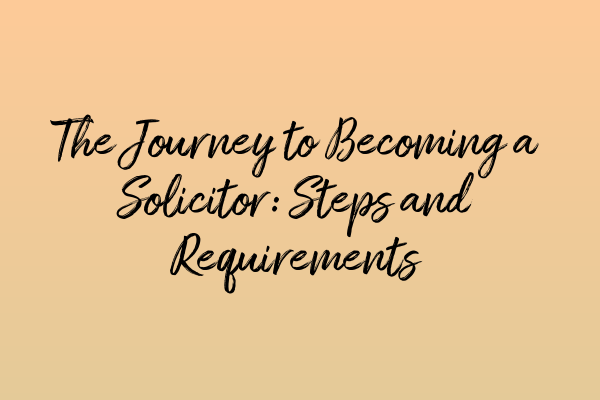The Journey to Becoming a Solicitor: Steps and Requirements
Becoming a solicitor is a career path that requires dedication, hard work, and a strong commitment to the legal profession. Whether you are just starting your journey or considering a career change, understanding the steps and requirements involved in becoming a solicitor is essential. In this article, we will guide you through the necessary steps to becoming a solicitor in the UK.
Step 1: Obtaining the Right Qualifications
The first step towards becoming a solicitor is obtaining the necessary qualifications. To do this, you will need to complete a qualifying law degree, also known as an LLB, or a non-law degree followed by a Graduate Diploma in Law (GDL). These courses provide a solid foundation in legal knowledge and skills, ensuring you have a strong understanding of the legal system.
During your studies, it is essential to excel academically and develop critical thinking and analytical skills. Additionally, participating in relevant extracurricular activities such as moot courts or student law societies can enhance your legal knowledge and demonstrate your passion for the field.
Related Article: Cross-Examination Techniques: Mastering the Art of Questioning
Step 2: Completing the Legal Practice Course (LPC)
Once you have obtained a qualifying law degree or a GDL, you will need to complete the Legal Practice Course (LPC). The LPC provides practical training and covers essential skills required for a solicitor, such as legal research, drafting, and client interviewing.
During the LPC, you will have the opportunity to specialize in specific areas of law, such as criminal law, commercial law, or family law. Choosing your specialization can help you develop expertise in your preferred field and increase your job prospects.
Related Article: Private Prosecutions: Exploring Non-Governmental Prosecutions in Criminal Cases
Step 3: Gaining Practical Experience
To qualify as a solicitor, it is essential to gain practical experience in a legal setting. This is typically achieved through a period of recognized training, also known as a training contract. A training contract involves working for a law firm or an organization with an in-house legal department for a specific period, usually two years.
During your training contract, you will work alongside experienced solicitors and gain hands-on experience in various areas of law. This will allow you to apply your theoretical knowledge to real-life scenarios and develop practical skills required in the legal profession.
Related Article: Ethical Challenges in Criminal Defence: Navigating Dilemmas
Step 4: Solicitors Qualifying Examination (SQE)
In 2021, the Solicitors Regulation Authority (SRA) introduced a new assessment process called the Solicitors Qualifying Examination (SQE). The SQE replaced the previously required Professional Skills Course (PSC) and the Qualified Lawyers Transfer Scheme (QLTS) for overseas lawyers.
The SQE consists of two parts: Part 1, which assesses functioning legal knowledge, and Part 2, which assesses practical legal skills. Passing both parts of the SQE is necessary to qualify as a solicitor in England and Wales. It is important to note that the precise details of the SQE may vary, so it is essential to stay up-to-date with the current requirements set by the SRA.
Step 5: Admission to the Roll of Solicitors
After successfully completing the SQE, you will need to apply for admission to the Roll of Solicitors. This final step officially recognizes you as a qualified solicitor, allowing you to practice law in England and Wales.
Continuing Professional Development (CPD)
As a solicitor, your journey does not end with qualification. It is important to engage in continuous learning and development to ensure you stay up-to-date with legal developments and enhance your skills. This is achieved through Continuing Professional Development (CPD).
CPD involves undertaking additional training courses, attending workshops, seminars, or conferences related to your area of practice. It is crucial for solicitors to stay abreast of changes in the law and maintain their competence throughout their careers.
Conclusion
Becoming a solicitor is a rewarding and challenging journey, requiring a strong educational foundation, practical experience, and successful completion of the Solicitors Qualifying Examination. By following these steps and meeting the necessary requirements, you can embark on a fulfilling career in the legal profession.
Related Articles:


Leave a Reply